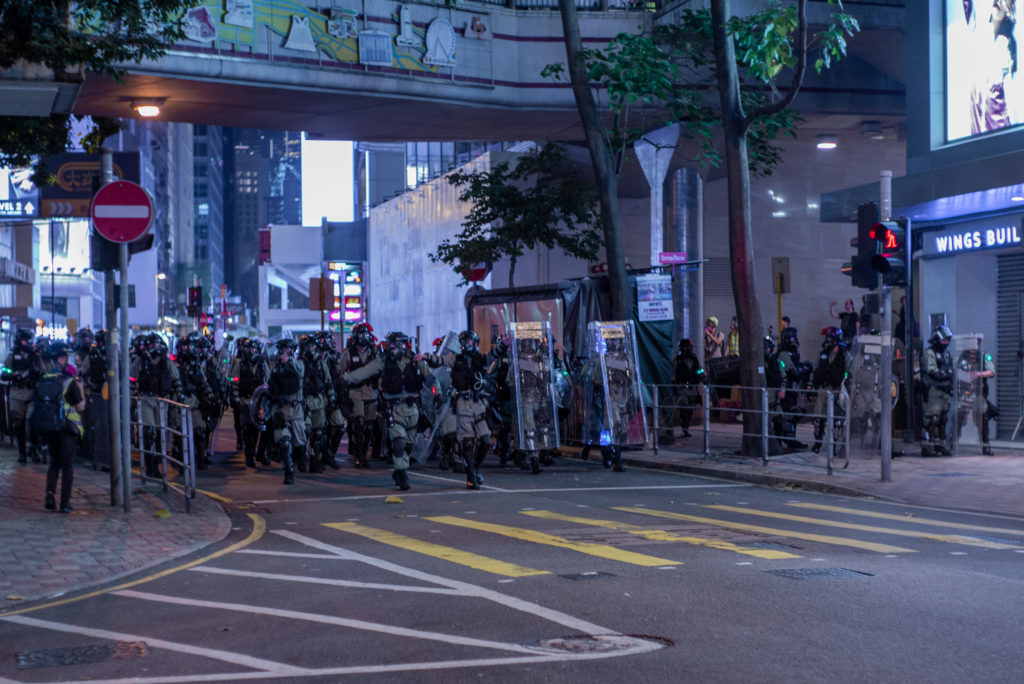It has been just over two years since China enacted Hong Kong’s National Security Law (NSL), a move made, as the UN Human Rights Committee explained, “without consultation with the Hong Kong public.” Since then, Hong Kong authorities have been robustly enforcing what is officially the Law of the People’s Republic of China on Safeguarding National Security in the Hong Kong Special Administrative Region. In the words of U.K. Foreign Secretary Liz Truss, the NSL has led to “a systematic erosion of liberty and democracy in Hong Kong.”
A review of the facts suggests the Foreign Secretary is not exaggerating. The first person convicted under the NSL, Tong Ying-kit, was sent to jail for 6½ years for “inciting others to commit secession,” by waving a flag with the slogan “Liberate Hong Kong, revolution of our times” (光復香港,時代革命), one of the main rallying cries of Hong Kong’s pro-democracy movement.
Earlier this year, police warned a shop called Not One Less Coffee “to put away some items which they described as sensitive, without explicitly stating which slogans or phrases on the publicity materials were deemed as potentially illegal.” Based on information provided by the shop owner, it appears the police were referring to items with phrases “resist with you” and “without any fear”. It should be noted that the shop’s name is itself a reference to a popular pro-democracy slogan, “Five demands, not one less” (五大訴求,缺一不可).
The UN Human Rights Committee has called for repealing the NSL because it is incompatible with Hong Kong’s obligations under the International Covenant on Civil & Political Rights (ICCPR). This is an ironic twist, given that Article 4 of the NSL explicitly requires the ICCPR be protected. The UN Human Rights Committee has “underscored the shortcomings of the NSL, including the lack of clarity of ‘national security’ and the possibility of transferring cases from Hong Kong to mainland China, which is not a State party to the Covenant, for investigation, prosecution, trial and execution of penalties.”
In addition to the NSL itself, Hong Kong authorities are also dusting off sedition offenses, not invoked since the 1960s, to go after pro-democracy activists. On July 5, 2022, five speech therapists were put on trial for writing “seditious” children’s books, which portrayed Hongkongers as sheep under threat by Mainland Chinese wolves. Sedition charges have also been brought against six individuals who clapped during court proceedings against lawyer Chow Hang-tung, herself jailed for organizing unauthorized vigils in remembrance of the victims of the 1989 Tiananmen Square crackdown.
Looking at the actual impact the NSL has had on Hong Kong, it is hard to think of a more consequential piece of Chinese legislation in the recent past. To be sure, the NSL was not solely responsible for Hong Kong’s dramatic transformation; it simply reflected changes in the Chinese Central Government’s vision for Hong Kong and provided a new legal framework for implementing that vision. Moreover, as discussed above, other legal tools have been used by Hong Kong authorities to do Beijing’s bidding, including some left in place by the British. Yet the NSL perfectly encapsulates Hong Kong’s new reality, one in which long-standing legal protections have been swept aside and further integration with the Motherland looms.
In its design and use of the National Security Law, Beijing has been quite transparent about what it wants Hong Kong to be. The question for foreign businesses is whether they are willing to come to terms with the new Hong Kong.

























